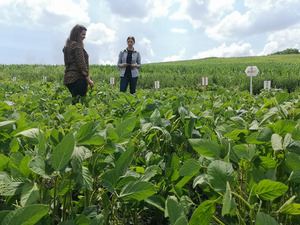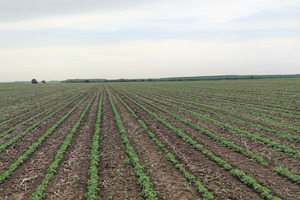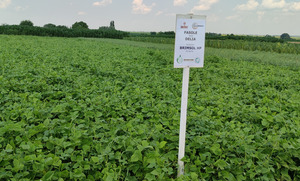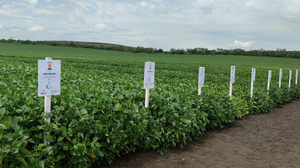Case study 8: Romania: Diversification of cereal-based rotations under adverse conditions
Cluster 2: Crop diversification under adverse conditions
Despite rather good soils, Romania is not generating corresponding yields. The case study assessed whether longer rotations, especially with leguminous crops, can help improve yields and the ecosystem at a reasonable economic cost.
What were the main problems underlying the emergence of the case study?
Despite Romania’s relatively good and deep soils with high organic matter content, yields are not stable. While climate change and use of chemicals can decrease potential yields, short crop rotations likely also play a role. Crop rotation in Romania usually includes winter wheat, corn, rapeseed and sunflower and it is often quite short (often 3 to 4 rotations per year). There are also other points that could act as bottlenecks for increased rotation:
- These aforementioned crops are seen as the most profitable crops in Romania so farmers are reluctant to add others.
- Romanian farmers have a long tradition of planting these few crops which means they have extensive knowledge, making these crops less risky than others.
- There is a lack of local markets for more diversified products
- External markets mostly demand these four crops and the downstream market is quite well organised for them.
The need for longer rotations with greater crop diversity seems obvious, especially with legumes. Would it be possible to develop niche markets to improve profitability
How was the problem addressed and which actors were involved?
AIDER is working with its farmers' network and monitoring trials to identify how to enhance crop diversification in an economically and environmentally sustainable way. In addition to the farmer network, the case study has also involved market actors (consumers and traders).
Although the majority of actors are farmers, the case study is also supported by seed companies (know-how and testing plots), plant protection companies, R&D teams and consulting companies.
Solution investigated
The case study assessed the agronomic benefits (and their economic impact) of a more diversified crop rotation. It assessed the results from trials conducted on micro-parcels and will check them against the field data to improve knowledge of legume production.
Lupine, vetch, Lathyrus (grass pea), soybean, faba bean and alfalfa have been tested on a larger scale (farm level), for various aims: food, feed or cover crops, both in conventional and organic systems.
In AIDER’s test micro-parcels/trials, organized in partnership with research institutes, we are monitoring how peas, chickpeas, lentils, beans, lupines, vetch, Lathyrus (grass peas), faba beans and soybeans are responding to Romania's environmental conditions.
These collaborations with farmers and research institutes have provided data that will support knowledge and provide an exchange of experiences, as it covers the main climatic conditions in Romania (eastern, western, central and southern Romania) and the main technologies: conventional or organic in minimum-till, no-till or strip-till.
Expected outcome
The main outcomes expected from the case study:
- The main outcomes expected from the case study:
- Diversification practices that promote improved soil biological status
- The benefits of diversification were evaluated and communicated through AIDER's network (indicators).
- The upstream and downstream organizations fostered profitable conditions for legume production in the whole rotation (which is the main barrier for farmers).
- Species and varieties were tested in different locations and climate conditions, with different technologies to improve the farmers' knowledge.
- Networking between farmers was improved; their experience in legume cropping can be of value.
AIDER aims:
- to find the best crops to improve soil conditions and generate enough profit for farmers;
- to develop partnerships between farmers upstream and downstream, to assure sustainable value chains;
- to find the right message and tools to motivate farmers to change practices towards more sustainability.
Relevance for the DiverIMPACTS goals
In order to achieve large-scale crop diversification, it is necessary to show agronomic and environmental benefits, but also the economic benefits. This case study is addressing this challenge in order to achieve the full potential of these production systems.
Case study legacy
Through the DiverIMPACTS project, we built an extensive network of actors and partners and gained extensive knowledge from the tests conducted at the farm level and in micro parcels. The results of our case study allow us to continue our mission: developing legume crops in Romania.
We will continue our testing and monitoring activities
The tests brought us significant amounts of data and know-how, a solid base for the future of legume cropping in Romania.
The strong network of farmers developed during the project will be maintained in the future. The main actors (farmers) involved in the project will continue field trials with legumes (as main crops or cover crops). In addition, our case study will continue to provide technical support to farmers in their diversification efforts.
Field Days for experience exchange, webinars and workshops for communicating the test results, newsletters (monthly) and technical guides on legumes cultivation are some of the activities that will continue after the end of the project.
We will provide training and support for farmers to achieve low-carbon-footprint farms.
In the DiverIMPACTS project, our case study conducted a multi-criteria assessment (MCA) to evaluate and demonstrate the benefits of diversification. It used indicators to show the impact of longer rotation with legumes. Performing this type of analysis, we noticed a growing interest in "carbon farming" due to the development of voluntary markets for carbon certificates.
A partnership with two companies (Romanian and French) secured funds to measure the carbon footprint on ten farms. Besides establishing the carbon balance at the farm and/or field level, our case study provided support, training and tools for farmers to implement the practices meant to lower the greenhouse gas emissions and increase the capacity of their soil to capture and store carbon. This support will continue beyond the lifetime of the DiverIMPACTS project.
Network, partnerships and collaboration developed during DiverIMPACTS will be maintained and extended.
The DiverIMPACTS project facilitated the connection and collaboration with universities and research institutes, with our case study being the link between the R&D sector and farmers.
A consortium of seven partners emerged from these partnerships: our case study, three universities, one research institute, and two SMEs. At the beginning of 2022, the consortium submitted a proposal under the call "EGNSS and Copernicus's applications fostering the European Green deal", HORIZON-EUSPA-2021-SPACE-02-51.
Subtopic - From "Farm to Fork": a fair, healthy and environmentally friendly food system: EGNSS and/or Copernicus-based solutions that provide food security and traceability across the entire supply chain and valorisation of the "made in Europe". Evaluation results are expected to be communicated in July 2022.
The case study mission, even after the end of the project, remains the same: Promoting exchange about rotation diversification for farmers and stakeholders by evaluating environmental and economic impacts to avoid soil degradation and develop market opportunities.
Further information
Links
- YouTube.com: Platforma demonstrativa de soia DiverIMPACTS- Aider 2021
- YouTube.com: Agricultură Integrată Durabilă Economic Rentabilă la Agronova
Case study team
- Anca Moiceanu, AIDER, case study leader




 tap and then scroll down to the Add to Home Screen command.
tap and then scroll down to the Add to Home Screen command.